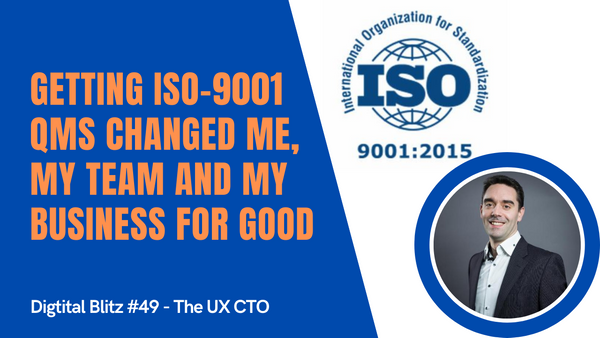If you look up the definition, ISO 9001 is the international standard that specifies requirements for the quality management system - or the QMS. Companies who are getting this accreditation must demonstrate the ability to consistently provide products and services that meet customers' and regulatory requirements.
More than a set of checkboxes that you need to tick, or policies and paperwork that you need to produce, it's really about introducing a mindset shift for your team. This, I think, is what has the biggest impact on the entire business. It has for me as well and it turned out for the better.
I think the whole concept of ISO 9001 and this notion of continual improvement does not apply only to the business processes.
It also applies to us as humans.
I personally learn from my mistake and trying to be 1% better every day. I continually want to improve and be a better dad, a better husband, better friend and colleague. I think most of you want to achieve that too, isn't it?
Let's explore how ISO 9001 can benefit your business but more importantly, how it can help the individuals in your team.
Let's get to it.
The ISO 9001 process
When setting up a QMS such as ISO 9001, you will have to follow the official standards. There's a guide that covers several principles around leadership, planning, support, operations, performance, monitoring and improvements. We started on that journey almost 10 years ago now in our business. We've had a lot of time to embrace the concept, implement it, refine it and grow with it.
And yes, we've had to write a lot of policies, new documents, we've had to organise more meetings to plan and review and make decisions... we've had to spend money on auditors, system upgrades and tools to help us manage all that growth... it's been a lot of work!
5 benefits of achieving ISO 9001 accreditation
More importantly, going for and achieving being the ISO 9001 accreditation has had a bigger impact on me, my team and our entire operation. I'm going to demonstrate that through five different points.
1. No-blame culture
The first is that it introduced a no-blame culture. Like anywhere, things will go wrong. No one is perfect. One person or the process is never perfect... but instead of blaming someone for a mistake, It really changed my mind and our team's mindset, as we started asking: "did I brief that person correctly"? "Did I give them the right information and the right tools to succeed"? So when something fails, it's becoming everyone's responsibility. We work as a team to identify what went wrong, fix it, and then we learn to move on. We learn from it and then go on to the next task. That has really helped a lot with the team culture and creating a safe environment for everyone.
2. Increased efficiency
Second: it increased the efficiency, both at the individual level and team / global level of the company. It's related to the first point, really. As you document your process and you tweak and improve it after each issue - when an issue happens - it helps as you don't have to make the same mistake again, you stop wasting time. I've also noticed that it helps a lot in training and onboarding new team members, as they get a good base of documentation to start with.
3. Start measuring
Third, it made us think about measurement. There's this famous quote that says something like "you cannot improve what you don't measure". This is really true. We started tracking our customer satisfaction. More recently rolling it out and measuring our team's satisfaction too, to ensure that the projects that we're taking on board are a good match, both for us and for our clients.
4. Risk-based approach
Fourth, it made us think differently about risks. Whether it's implementing a new tool, a major deployment for a client or opening a new office, for any major change happening, it forces us to do proper due-diligence. You have to think about the edge cases, what could go wrong and start planning to reduce those risks. We've created templates for the items that we always follow, and it helps everyone making decisions.
5. Improved quality
Finally, the fifth point is that it improved the quality of our work. I assume that's not a surprise for you... it's a QMS after all, if it didn't help the quality, it would be quite a fail! Delivering better quality means happier clients, and that means more recommendations, which means growing business. Everyone's happy!
That's it for today. I might do a follow-up video about the other main standard that we've gone through: the ISO 27001 about data security and it might highlight a similar impact...
If you are considering implementing a new process or achieving an ISO certification, just get in touch. Don't forget to subscribe to my YouTube channel and follow me on Twitter to keep learning with me and grow your career in digital.
Until next time, stay safe and see you soon.



